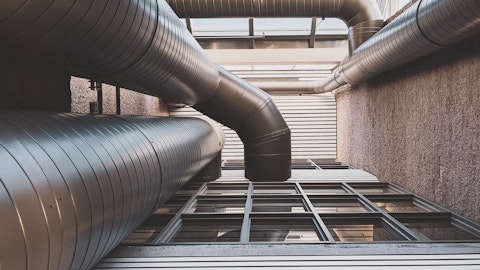Brian Coleman: Historically, participants in our industry are less prepared than we would think they should be, and likely that’s the case for next year. However, what we have been doing particularly for this calendar year and probably started the second half of last year is trying to create more awareness and participate in educational seminars and training seminars geared for contractors. So I think the folks that we’ve been able to touch and reach and speak to and folks that listen to the playbacks and things like that should be prepared. You raised a good question, cylinders and access to cylinders. There may be some reclaimers that will have difficulties getting access to cylinders and supporting greater recoveries. We already use a pretty substantial reusable fleet, which recovery cylinders are reusable steel as opposed to disposable.
And so while we can’t say that there won’t be some shortages on cylinders next year, particularly if there’s a significant growth in reclamation, I think our position with cylinders and availability of access to getting cylinders possibly would be better than most others in the reclamation industry.
Austin Moeller: And do you expect that your current number of laboratories and your footprint is sufficient to meet the uptick in reclamation? I know you’ve talked about adding chips.
Brian Coleman: You’re correct. We’re still waiting for the 2022 data should be out very shortly, but as it goes back to the 2021 data, if you look at the totality of the reclaimed pounds, 2021 was lower than some of the peak years by a few million pounds industry-wide. So today, let’s say reclaimers on average are probably reclaiming fewer pounds than what was the peak period. But even back to the peak period, the EPA has done studies on our industry that would have said that there was enough capacity to more than triple the volume. We’ve always talked about we could always go to a second shift if we needed on a reclaimed capacity. We’ve been investing each and every year on more lean production processes, but also automation, particularly around the handling of cylinders so that when a cylinder comes in the door within two business days, a cylinder goes out.
And a lot of the automation that we’re adding would correlate to how the propane industry evolved in the mid to late 90s with the general swap programs that you see today and how to refurbish and move steel through a plan to their fill lines and so forth. So we spent a lot of time and energy. We think we’ll be able to meet any growth in capacity. We certainly do expect to have additional CapEx dollars, but typically our CapEx is $5 million annually or less. And likely that kind of trend I would expect to continue unless there was something meaningful in a change of what we decide to do.
Austin Moeller: Okay, great. Thanks for the details.
Operator: We have reached the end of the question and answer session. I will now turn the call over to management for closing remarks.
Brian Coleman: Thank you, operator. I’d like to thank our employees for their continued support and dedication to our business. I want to again thank our long time shareholders and those that recently joined us for their support. We look forward to speaking with you after the fourth quarter results and have a good night, everybody. Thank you.
Operator: This concludes today’s conference and you may disconnect your lines at this time. Thank you for your participation.
Follow Hudson Technologies Inc (NASDAQ:HDSN)
Follow Hudson Technologies Inc (NASDAQ:HDSN)
Receive real-time insider trading and news alerts



